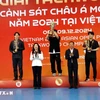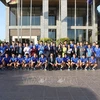How to build up the capacity for Vietnamese Taekwondo athletes and boost Vietnam-Republic of Korea (RoK) cooperation in this martial art topped the agenda of a seminar in Hanoi on Dec. 4.
Co-organised by the Vietnam Taekwondo Federation (VTF), the RoK Cultural Centre in Vietnam and the RoK Taekwondo Instructors Association (RTIA) in Vietnam , the seminar drew the participation of a large number of Taekwondo experts and trainers from both nations.
The seminar also highlighted the achievements, experiences and lessons of the RoK and Vietnamese Taekwondo teams at the 16 th Asian Games (Asiad 16) which was held in China ’s Guangxi province last month.
Head of RTIA in Vietnam Kim Jung Sik said the athletes’ rapid adaptability to scientific devices and modern technology plays an important role, helping them to achieve high results in international and regional competitions as the skills gap among the athletes are narrowing.
This is a lesson the RoK has drawn from its failures at Asiad 16, especially after the country’s athlete lost to his Iranian rival because he had yet to adapt to changes related to electronic breastplates.
While sharing the view, VTF General Secretary Truong Ngoc De said Vietnam needs to build effective competition methods and improve the quality of athlete selection if it wants to get back its regional top position and win gold medals in Asiad and Olympic London 2012 in this martial art.
Taekwondo has strongly developed in Vietnam in recent years, with more than 40,000 trainees across the country./.
Co-organised by the Vietnam Taekwondo Federation (VTF), the RoK Cultural Centre in Vietnam and the RoK Taekwondo Instructors Association (RTIA) in Vietnam , the seminar drew the participation of a large number of Taekwondo experts and trainers from both nations.
The seminar also highlighted the achievements, experiences and lessons of the RoK and Vietnamese Taekwondo teams at the 16 th Asian Games (Asiad 16) which was held in China ’s Guangxi province last month.
Head of RTIA in Vietnam Kim Jung Sik said the athletes’ rapid adaptability to scientific devices and modern technology plays an important role, helping them to achieve high results in international and regional competitions as the skills gap among the athletes are narrowing.
This is a lesson the RoK has drawn from its failures at Asiad 16, especially after the country’s athlete lost to his Iranian rival because he had yet to adapt to changes related to electronic breastplates.
While sharing the view, VTF General Secretary Truong Ngoc De said Vietnam needs to build effective competition methods and improve the quality of athlete selection if it wants to get back its regional top position and win gold medals in Asiad and Olympic London 2012 in this martial art.
Taekwondo has strongly developed in Vietnam in recent years, with more than 40,000 trainees across the country./.



















